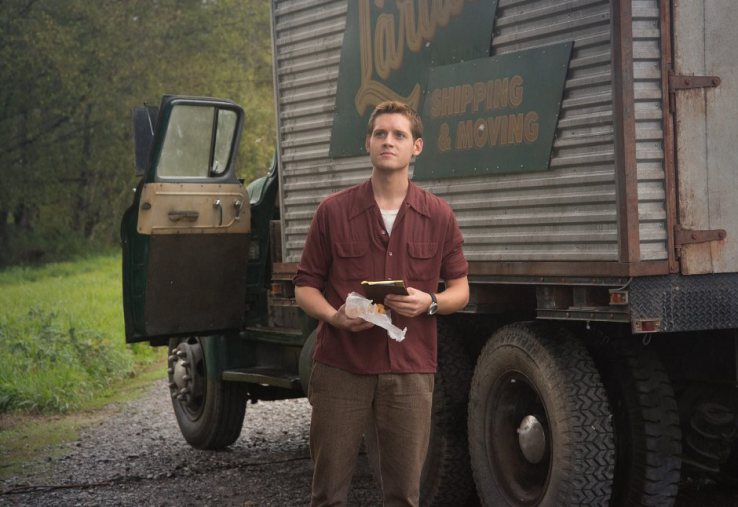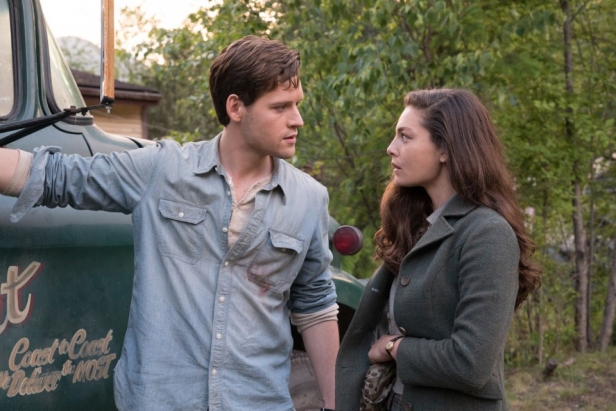The latest Philip K Dick adaptation to hit the screen will be Amazon’s The Man In The High Castle, developed and written by The X-Files writer and producer Frank Spotnitz. We sat down for a chat with him about the show.
How did you approach expanding the world of the novel to turn it into the TV show?
Warily, I should say. I didn’t really want to change anything, but I knew I had to, I knew it wasn’t a TV narrative. So what I tried to do is think what’s this book really about, and what can I do to give it a plot and other characters that allow me to explore it more thoroughly? So I changed the book the man in the high castle had written into a film, I thought that would work better in this medium. I created a personal relationship between Juliana and the film by giving her a half sister who originally was carrying the film. And then I added characters who really are antagonists for our central characters – John Smith in New York and Inspector Kido in San Francisco. And then I changed the politics of the relationships a little bit. I rewound Frank and Juliana’s relationship so that they’re still together in San Francisco. The book starts with them split. And I changed Joe a bit. Because really that’s the centre of the show. Everything revolves around these three characters – Juliana in the middle, Joe and Frank, two very different men, on either side.
When Joe first showed up he seemed to be the Joe from the book, but now he seems to be going in a very different direction.
Yeah. You have to keep watching because he’s a very ambiguous character, and I think Luke [Kleintank] plays him very well. You’re never quite sure. You know who you hope he is, but you’re not quite sure if he really is who you want him to be.
‘The Grasshopper Lies Heavy’ (the film-within-a-show) seems to have mystical significance.
Yes. It does. Like I said, I really wanted to honour the book and stay faithful to it. It’s very out there. It’s really difficult to grasp. I’ve read the book more that once and I still find sections of it very difficult to grasp. So I do it, but I do it very slowly. And I’m trying to do it in a way that it doesn’t overshadow the human drama, which to me is the most interesting part of the show. I think the films and the I-Ching, they’re really interesting elements, but only to the degree they help me understand the human experience of being in this world better. So I’m trying to strike that balance.
How did you as a writer and then the production team go about creating the alternate historical period of the show?
We had many, many discussions about how things would have developed, and how they wouldn’t. What would be there and what wouldn’t be there. There was a lot of optimism in 50s and 60s design that we thought would not be there, so that affected things like cars. The tough thing about the show was that it has to feel like 1962, like what we all imagine 1962 to have been, but not. Finding that balance between ‘yeah, that’s familiar’ but ‘oh, it’s slightly off’ was the tricky part. And we were very aware that all these decisions we were making we’ll have to live with for the life of the series, so we had to think about each one.

There’s a lovely moment in episode 2 where there’s a song playing that’s done in a very familiar early 60s American style, but it’s sung in Japanese.
We found some amazing music. It continues throughout the series. And that’s a really interesting thing, the music of the show, because obviously so much of our music today is informed by African American experience in the US, right? And obviously British music, rock and roll, that never would have happened. Think about the loss. I still think about that. All the people we lost in World War 1 and World War 2 and the Holocaust, all the human potentiality that we just don’t know what we’ve missed out on.
Many of the themes of the show are very relevant to a modern audience. Was that intentional?
Yeah, I’m always thinking about the modern audience and why the story matters to people living today. And I think especially that theme about how to hold onto your humanity in an inhuman world, not taking for granted that good will prevail. Look back at the sacrifices that people made to win the Second World War. What sacrifices are we making today? What are we doing to ensure that we build a more just world? These are questions worth considering.
The original book was left slightly open-ended because he always had the intention of writing a sequel. Do you have ideas for where you’d want to go beyond the book?
Oh yeah. There are certain things in the book we still have not got to in season one. But there’s many many other things that I’d like to do… You literally have the whole world in which to tell the stories, you could not get a bigger canvas.
John Smith is a very interesting character – are we going to see more of him and his family?
Yes. Quite a bit. He’s one of my favourite characters and Rufus is obviously a masterful actor, so he’s really compelling.
You’ve taken an all American family and then stamped the Swastika on them.
Yes. It’s really interesting. You look at scenes like that breakfast scene in episode 2 and it’s like, what’s the difference between what he’s saying and what we might say at one of our breakfast tables? Is there a difference? If so, where does it come in? I think there’s a difference in my mind. That’s why those scenes are so interesting because they’re so close to our world and yet they’re not, and I think that’s why they’re so unsettling, because I think people see it and they believe it. They believe it’s possible that that’s the way it would go down.

Are you aiming to humanise the ‘baddies’
I think the thing about Nazis is they’re wonderful bad guys, but they’ve been done so many times they’ve become like cartoon characters. And, this is controversial to say, but not every Nazi officer was a madman. A lot of them probably were good fathers and loving husbands who had rationalised service to an evil cause, and that’s the John Smith character. And that’s really interesting to me, how he rationalised doing bad things. And that’s not something that’s limited to fascists or Nazis. Again it’s just a question that I put out there for people to answer as they will.
With the Japanese characters it must be a hard balancing act, because you want to show that they’re in conflict with both the Americans and the Nazis.
Yes, that’s right. And amid the Japanese there are at least two kinds of Japanese characters, more as the series goes on, but in the beginning there’s the Japanese represented by the Tagomi character, who is very enlightened, spiritual, Buddhist Japanese, and then there’s the Kido character, who’s the fascist Japanese. Which, you know, a lot of modern audiences have forgotten, but the Japanese at the period of World War Two were every bit as brutal and terrifying as the Nazis. Those two versions of Japan are at war with each other. And I think Juliana is a character who can embrace both. In the pilot she can study Aikido and recognise the beauty of it, while on the other hand her father was killed by the Japanese. And she can reconcile those two contradictions.
There have been many Philip K Dick adaptations – what is it about his work that lends itself to such great adaptations?
I just think he had such an interesting mind. I mean, obviously, if you’ve read anything about him, he was a troubled man, he had a very difficult life, but he thought very, very deeply about things. And I think that’s what made it hard for him to connect commercially, you know, at the time he was writing. But it’s why he’s endured and actually become more and more popular. We’re catching up to his ideas. But they’re still challenging, you know, and I still grapple with them and the meaning of certain things. But they’re infinitely rewarding. Science fiction is supposed to be about something. And I think sometimes we forget in a lot of the science fiction that’s made today, it’s not interesting unless it’s about ideas.
Not just about aliens shooting each other.
Yeah. They’re not supposed to be just action movies.
Episodes one and two of The Man In The High Castle are already available on Amazon. The full Season 1 will become available on 20 November.
